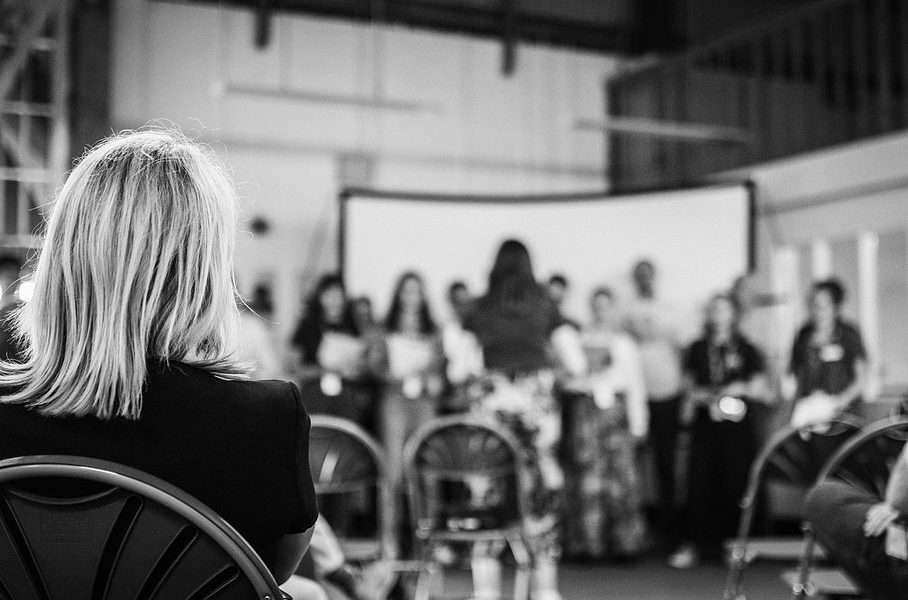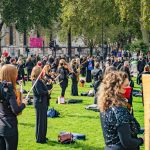“It’s part of a broader puzzle of humanising people in prisons.”
MAISIE HULBERT, FOUNDER OF SING INSIDE
The capacity that music has to shape the world in non-musical ways is hardly a novel concept, in fact many have explored such benefits for generations. One organisation in particular that has caught our attention is Sing Inside, a charity that brings singing workshops into prisons across England. This week AM writer Will O’Brien was lucky enough to sit down with founder and Chief Executive Maisie Hulbert, to find out a bit more about the work of this extraordinary organisation.
At the core of Sing Inside is a basic concept: music has the power to “break down social barriers and encourage creativity, confidence and a greater sense of self-worth.” They have taken this concept and applied it to an area desperately in need of reform. By taking groups of singers into prisons and leading workshops with the residents, Sing Inside seeks to build bridges and mutual understanding between those within the prison system, and those outside of it. Hulbert explains:
“Music in those sorts of settings has a genuine power. We take singing workshops into UK prisons, and these can either be a day long or a longer course, say three or four days in a row, learning a programme of music for a performance or recording of some kind. We work with groups of volunteers matched with a group of prison residents who form a choir together. We take in a musical leader and accompanist, but the founding principle of Sing Inside’s work is that everyone approaches this in the same way: we don’t have pre-rehearsals with the volunteers, they don’t learn the music before the day. The importance of this in prisons is that they are a space where people don’t really have the opportunity to express themselves creatively at all, and singing workshops provide a space where they can.”
There has been growing evidence in recent years that involvement in group and community music making can have exceptionally positive influences over an individual’s social, emotional, and cognitive wellbeing. I was keen to explore with Hulbert why group music making could prove such a positive activity for prison residents in particular:
“In prisons, residents are very compartmentalised. Their movements are highly monitored, and they need a lot of permission to express themselves. [Sing Inside] provides a way of facilitating contact with other people, which is ultimately a human right. This is particularly important for people in prison, who can often leave prison isolated from their families, isolated from communities, and not having spent much time working with others or understanding their unique added value to groups they work with.”
Hulbert further highlighted that the mission and benefits of Sing Inside are a two-way street. It is not just for the benefit of prison residents, but to help work as part of a broader puzzle in shifting the perception of prisons and prison residents to those on the outside:
“We also really believe that the reason our work is important and that it works is because we take volunteers into the prison system, and there are lots of benefits to this in terms of questioning our own assumptions about people in prison, understanding people in prisons as people and not as an offence or a prisoner number. Ultimately seeing them as an individual person with their own needs and wants… It’s part of a broader puzzle of humanising people in prisons.”
One thing that really struck me when reading about the work of Sing Inside was the fact that they were able to encourage and inspire residents to engage in what I believe to be one of the most personal and vulnerable forms of expression: singing. To my mind, singing can elicit a greater feeling of vulnerability for the participant than instrumental music making or other performative activities. It is you and your voice, with nothing necessarily to hide behind or support you. I was interested to hear Hulbert’s thoughts on this:
“We all have our own vulnerable and individual worries about doing things, and the good thing about singing in a group is that you can really get a sense of your contribution to a whole. Your voice on its own may not be what you want it to be, but as part of something bigger, you can get a sense of the role that you can play in a group. Singing is obviously just one skill, but I think that the confidence to offer something up and share it with the group, and keep committing to sharing that with a group for a performance, is a really powerful thing.”
Since its conception in 2014 as a society of the University of Cambridge, Sing Inside has spread across the country first into Oxford in 2018, and later into York, Staffordshire, and London. In 2019-20 the charity facilitated 28 day-long visits and 2 multi-day intensive courses in 15 prisons, with volunteers ranging from student singers to members of choral societies and community choirs. I was interested to find out when the decision was made to move away from being a solely student organisation, and into working with local choirs and communities:
“We have been expanding this side of our work, but it has been curtailed this year [by the pandemic]. The idea is that whilst students are a willing and able volunteer body and are brilliant, they’re often not tied to the place [in the same way as local residents]. This is not the be all and end all which we see in our student volunteers who are an essential core of our volunteer base, but we have seen how powerful it can be for people who have lived somewhere for a long time and never understood their local prison to visit it and engage with it alongside others. That is something that in the next couple of years we will look to embed a bit more in our work.”
It is clear from talking to Hulbert that she is exceptionally passionate about her belief in the power of this work. She quite rightly highlights that those volunteering on visits may well go on to be influential in their communities as employers, politicians or educators, and that changing the perception of prisons and their residents within the wider community is essential in improving rights for prisoners and their perception within society as a whole. This issue is really the crux of organisations such as Sing Inside which work to challenge the traditional and deeply held societal views of prisons and their residents. We all need to strive to view everyone within the justice system as a human with fundamental rights and intrinsic value.
There are a number of ways in which we can all support the work of Sing Inside: the simplest way to get involved is to subscribe to their mailing list and check out their social media pages, as by doing so you can be alerted to volunteering opportunities near you and supporters’ updates. Recovery from the pandemic is going to be especially challenging for organisations whose work relies on integration and interpersonal connections, and we all can all be a part of that recovery to ensure that charities such as Sing Inside bounce back stronger than ever before. You can also become a regular donor to Sing Inside for as little at £5 per month, providing the organisation with the vital ongoing funds to get started visiting prisons again as soon as this becomes possible.
Read Sing Inside’s annual report from 2019-20 to find out more about what they delivered: https://www.singinside.org/accounts-and-reports
Check out their website to find out more and to get involved: https://www.singinside.org/
Follow them on Social Media: Facebook, Instagram, Twitter
Words by Will O’Brien
Photo © MBP Productions









